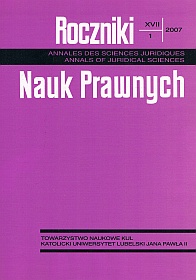Prawo duchownych do utrzymania w unormowaniach Kodeksu Prawa Kanonicznego z 1983 roku
Abstrakt
The provision of sufficient, fair (appropriate) and perpetual financial maintenance is a reciprocal benefit that is granted to a priest who has devoted himself and is loyal to the Church in his total and unbounded by time or place service, and who was ordained to perform his ministry with full readiness resulting from the above. Therefore, a priest has a right to a stipend by virtue of his incardination into a particular Church or other ecclesiastical structure that has a right to incardinate, and the incardination ordinary has a legal duty to provide such a stipend. Canon 281 is regarded as binding although it does not mention sustenatio but remuneratio. The latter constitutes an element of the former – the priest's maintenance. He should receive not only remuneration for the work done, but also have social care provided (assistentia socialis). The claim concerning the right to a stipend is a composite claim, which embraces the right to remuneration for active ministry as well as the right to preventive and social care in case of illness, disability, and old age. All clergymen are entitled to this legal claim without damage to permanent deacons, in compliance with the restrictions of Article 3 of Canon 281, excluding the cases in which priesthood is lost or when the priest unlawfully refrains from accepting the office. The factors that affect the fairness of the stipend include: education, seniority (in this case it is the length of ministry in the Church), position held, environment, financial situation of society.
Copyright (c) 2007 Roczniki Nauk Prawnych

Utwór dostępny jest na licencji Creative Commons Uznanie autorstwa – Użycie niekomercyjne – Bez utworów zależnych 4.0 Międzynarodowe.


